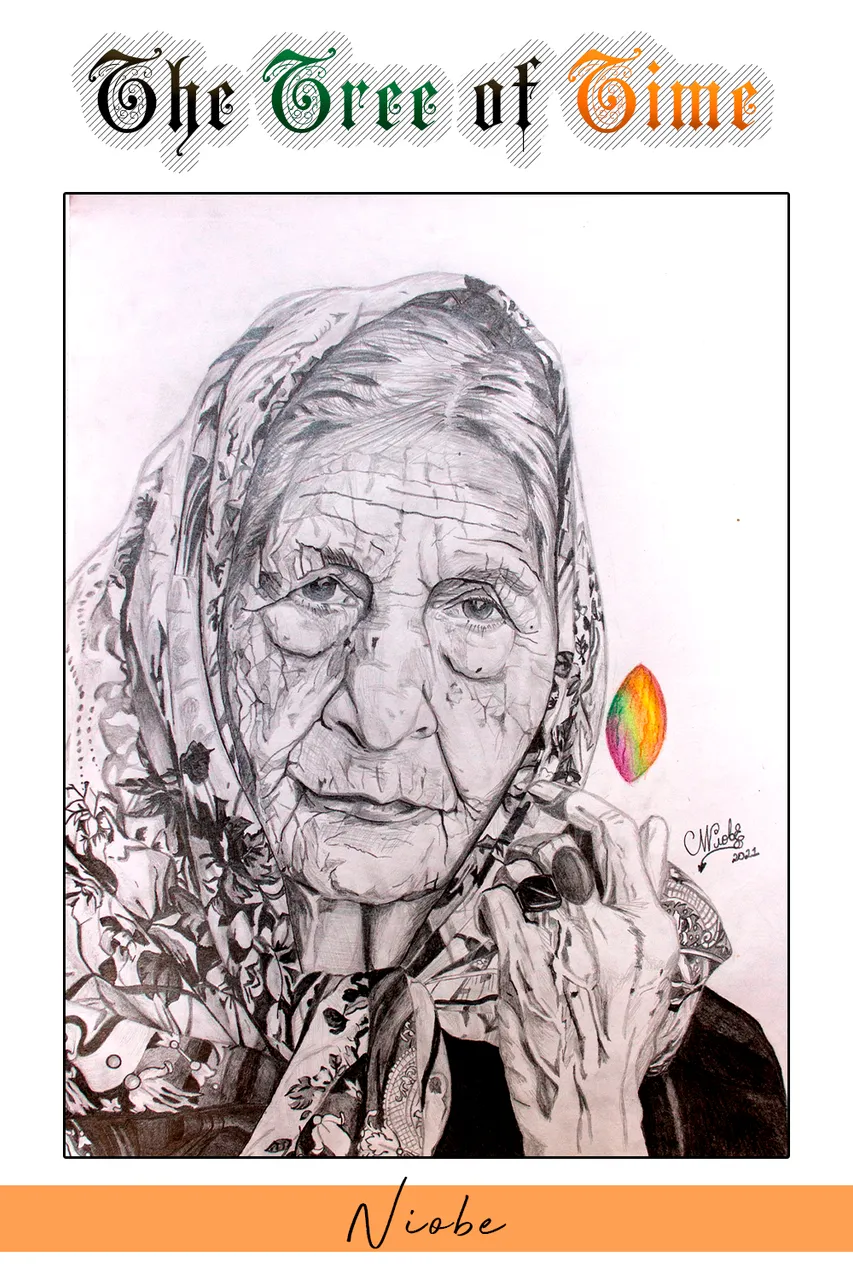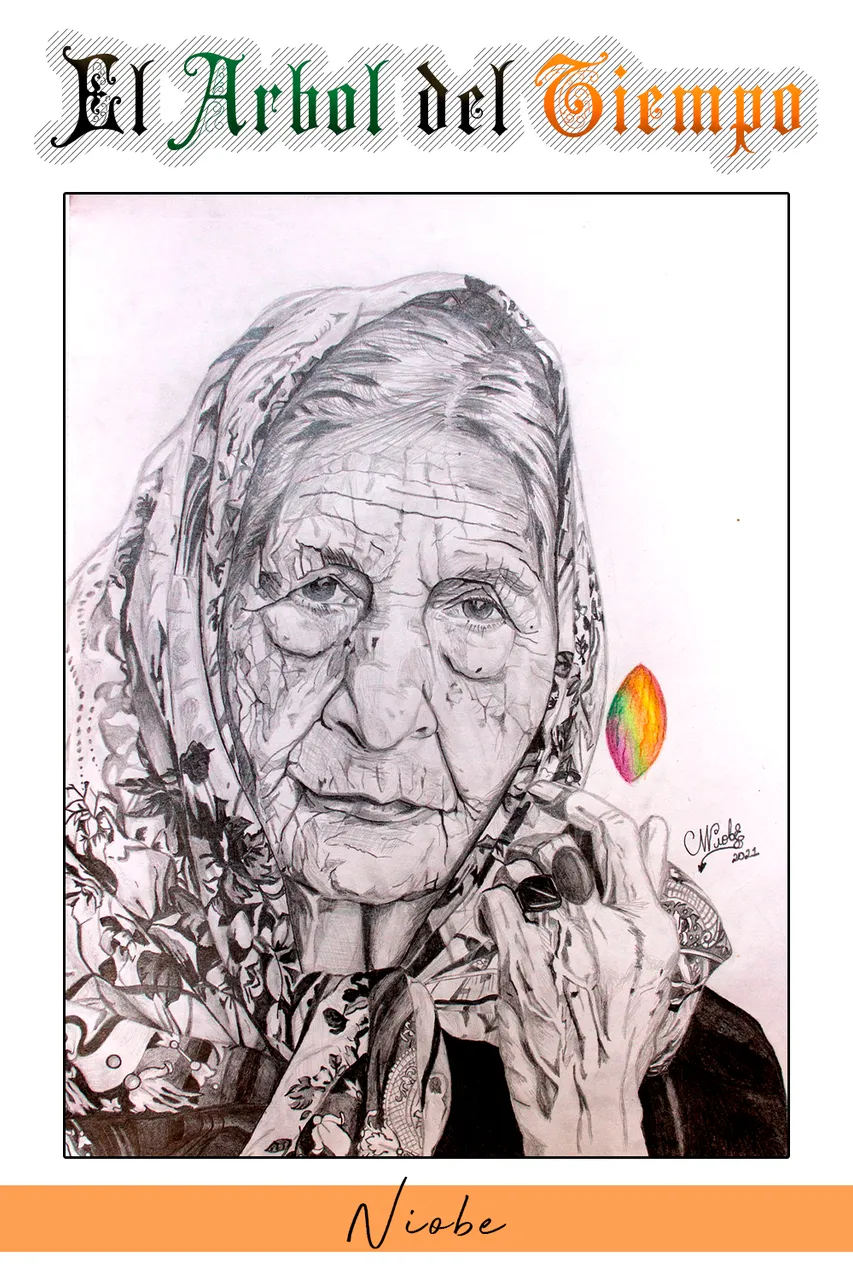— Porque tú no perteneces aquí. Toma. —Le dijo, y dejó entre sus manos una semilla con forma de almendra y de colores cambiantes— Tu deber es ir a recuperar tu juventud.
¡Quién sabe qué habrá sido del pueblo después de esa noche! Seguro esa pobre gente aún sigue bajo el hechizo de la joven, esperando algún mago o bruja blanca que los libere. Pero que conmigo no cuenten, ¿Qué más podría hacer yo? Yo soy solo una viejecita, esperando a las afueras de tu pueblo al próximo niño desobediente que quiera escapar de casa.
¿Qué te pareció la historia? ¿Te esperabas ese final? ¿Cuál fue tu personaje favorito? ¡Cuéntame tus impresiones! ¡Tus comentarios me dan herramientas para mejorar!
¡Muchas gracias por leer!
❤️🍀


Original illustration. See the drawing process here.
THE TREE OF TIME
 here is a disobedient child in your village, I'm sure. Every village has one.
here is a disobedient child in your village, I'm sure. Every village has one.
In the village where I grew up, the disobedient boy was called Garadiel, and he was as brave and skillful as he was naïve and proud.
When he was only 7 years old, he ran away from home, determined to visit other towns and get a job and a girlfriend, as his older brothers were already doing.
On the outskirts of the village a sweet old lady offered him a job catching 9 chickens that had escaped from her. The task took him 5 days and 4 nights, during which the old lady let him sleep in her hovel, fed him, caressed him, and learned the reasons why he had run away from home: Garadiel wanted to grow up, have money, and be free to do everything adults did.
"Although I have no money to pay you, I can give you a magic seed, from which will be born a Tree of Time that will make you grow to adulthood".
The seed was almond-shaped and of shifting colors. Garadiel was to plant it right in the center of the square that was right in the center of the village. Only in this way it would work.
"But there is one condition," warned the old woman, "you must wait until the tree bears its only fruit, let it ripen for three days, and on the night of the third day pluck it and bring it to me".
The boy readily agreed, and planted the seed the same day he returned to the village.
The next day Garadiel woke up to find himself 12 years old, and in the center of the square there was a little tree with almond-shaped leaves of shifting colors.
Garadiel's parents were puzzled by its sudden growth, and the townspeople were amazed by the tree's abrupt appearance.
Garadiel approached to admire the tree along with the rest of the curious onlookers, and realized that the fruit was already coming up. Aware that someone else might want to pluck it, he brought a chair and sat down under the tree to keep an eye on it.
As the relationship between the boy and the tree became evident, many approached him to ask questions, but he answered them all with vague excuses.
His parents, suspecting the influence of some evil magic, ordered the boy to cut down the tree and never go back to the place where he had got it. But Garadiel would not do so before the tree had fully grown him into an adult, and, besides, he had made a promise to the sweet old lady, and by keeping it he could repay her for her care and affection.
By the end of the third day Garadiel looked about 20 years old, and the tree had grown taller than all the houses in the village, taller than the church and the bell tower; and the fruit, now ripe, had ended up at the top, almost unreachable.
But Garadiel, skilled as he was, found it easy to climb the thick trunk and the tangled branches, and that night he plucked the fruit and carried it to the old woman's hovel.
To his surprise, instead of the old lady he was greeted by a beautiful young woman who claimed to be her granddaughter. She promised to deliver the fruit to her grandmother and invited him to spend the night, to which Garadiel gladly accepted.
When he returned to the village the next day, he found a group of people worshiping the tree, praying and blessing it. The crops had begun to grow faster, and the sick were miraculously getting better. In gratitude to Garadiel, some gentlemen offered him the hand of their daughters, and many peasants brought him the fruits of their crops, which pleased Garadiel's parents so much that they forgot about cutting down the tree.
A box was waiting at the door of Garadiel's house at dawn the next day. It contained a newborn baby girl, and a note assuring that she was his daughter. Even such an unusual event seemed reasonable to him, and not being able to abandon a child to her fate, he named her Hittana and took her into his home.
That night, all the crops in the village began to ripen so fast that they withered before they were harvested, and all the diseases to advance so fast that they led to death before any medicine could be supplied.
Upon discovering this calamity, the villagers decided to cut down the tree, but anyone who tried to harm it began to age years in seconds, and would drop dead upon reaching one hundred years of age.
Knowing he was responsible, they forced Garadiel to cut down his own tree, and Garadiel felled and felled, becoming wrinkled and stooped. Just before he died he apologized to his family, revealing to them from where he had obtained the seed of the Tree of Time.
When the old man fell dead, the tree was still almost intact. The villagers then assigned the felling to Garadiel's parents, then to his brothers, and finally to his little daughter, who in a matter of minutes appeared to be more than 20 years old.
The maiden decided to put an end to that useless task and convinced the villagers that she would find the old woman who had given the magic seed to Garadiel, and bring her to destroy the tree.
So it was that Hittana arrived rampant at the hovel on the outskirts of the village, and asked the young woman for hints of the old woman.
"Although I can't tell you where to find my grandmother, I can give you a magic fire capable of destroying the Tree of Time".
The fire crackled in the shape of an almond and was of shifting colors. Hittana was to fuel the flame with the bones of the dead that had fallen among the roots of the tree. Only in this way it would work.
"But there is one condition," added the attractive young woman. "You must let it burn for three days, and on the night of the third day, bring me the pile of ashes".
Hittana readily agreed, and lit the tree on fire that same evening.
The tree burned steadily for three days, and during those days Hittana grew old and wasted away, until she became wrinkled and stooped. On the night of the third day the flame extinguished itself, and Hittana carried the ashes as she had promised.
The young woman received them gratefully and invited her to stay that night in her hovel, which Hittana accepted without complaint, since her bones, now fragile, and her muscles, now weak, prevented her from making the return trip without rest.
The villagers cheered Hittana when they saw her return. Thanks to her, plants stopped wilting and diseases stopped being instantly fatal.
Several weeks passed before the villagers realized that the problem had not yet been solved. The plants were now stunted and their fruit never ripened, while the diseases, which were not fatal, were never cured either, and the sick were left suffering forever.
They sent Hittana back to the outskirts of the village, with all their hopes pinned on the consumed woman, and the young woman again welcomed her with open arms.
"Although I cannot restore the health of your sick or your plants, I can give you some magic ashes, which will become appetizing food that will be a guarantor of well-being for all".
The ashes were of shifting colors, and came in an almond-shaped vessel. Each person in the village was to scatter a handful of ashes in their garden and water them with their tears. Only in this way it would work.
"But there is one condition," warned the young woman, as usual. "They must fast for three days, and on the night of the third day, offer a feast with all the food harvested and invite me to attend".
Seeing little choice, Hittana agreed, and distributed the ashes among all the villagers the very moment she arrived in the village.
Fruits, vegetables and greens, large and juicy, were born from the gardens, and kept growing for 3 days, while the locals resisted hunger with water, wine and goat's milk.
On the evening of the third day the greatest feast ever seen was held in the village, and the young woman of the hovel attended radiant, in her best dress. Everyone devoured the food with a frenzy, and just as the young woman had predicted, everyone who ate of it felt at once in their best condition, regardless of their age or illness.
However, Hittana noticed that, curiously, the young woman had not even wanted to try the food, so she sat down next to her to ask if there was any other way to thank her.
"Oh no! All of you have already done too much for me," she replied, smiling, "Your father gave me back my youth, you granted me eternal life, and all these people are just now surrendering their will to me. Tomorrow the whole village will obey every word I say".
Hittana stirred in her seat, alarmed.
"Why are you telling me all this?"
"Because you don't belong here. Take this." She said to her, and placed an almond-shaped seed of shifting colors in her hands. "Your duty is to go and recover your youth".
Who knows what became of the village after that night!! Surely those poor people are still under the young woman's spell, waiting for some wizard or white witch to free them. But count me out, what else could I do? I'm just a helpless old lady, waiting on the outskirts of your village for the next disobedient child who wants to run away from home.
What did you think of the story? Did you expect that ending? Which was your favorite character? Tell me your thoughts! Your comments give me tools to improve!
Thanks for reading!!
❤️🍀

Créditos - Credits
Edición de portada / Cover editing: Adobe photoshop
Escobita voladora / Flying broom - Vector de Dibujos animados creado por brgfx - www.freepik.es
Sombrero con cuaderno / Witch hat with book - Vector de Libro creado por brgfx - www.freepik.es
Letras mayúsculas / Capital letters: Grusskarten Gotish font from dafont
Castillo volador de firma / Signature flying castle - Imagen de my best in collections - see and press 👍🔖 en Pixabay
Traducción al inglés / English translation: DeepL versión gratuita -

 n tu pueblo hay un niño desobediente, estoy segura. En todo pueblo hay alguno.
n tu pueblo hay un niño desobediente, estoy segura. En todo pueblo hay alguno.

 here is a disobedient child in your village, I'm sure. Every village has one.
here is a disobedient child in your village, I'm sure. Every village has one.

